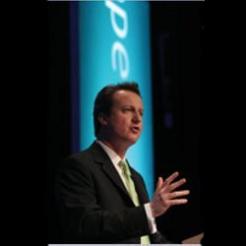Tonight, Senator George Mitchell will give the 15th annual Hinton Lecture. Seven years ago, a certain David Cameron MP delivered the eighth. Tania Mason looks back at his speech and finds a future leader determined to make things better for the sector.
Tonight the NCVO is hosting the annual Hinton Lecture, which launched in 1998 to commemorate the life of Nicholas Hinton, its former director who died in 1997. Over the years the event has provided a platform for an array of leading thinkers and opinion-formers from across the public and political spectrum. Speakers have included Sir Samuel Brittan, Dr Rowan Williams and Simon Jenkins, to name just a few. Tonight’s address, to be delivered by Senator George Mitchell, who played a key role in the negotiations for peace in Northern Ireland and the Middle East, will undoubtedly maintain the standard.
Those readers with long memories may recall that in 2005 the Hinton Lecture was delivered by the then-leader of the Opposition, a certain David Cameron MP. As I am fortunate enough to possess a copy of the book compiled by the NCVO containing the verbatim speeches of all the Hinton Lectures from Baroness Warnock in 1998 to Geoff Mulgan in 2007, I took a few minutes to look back at what he said all those years ago.
Cameron kicked off his lecture, which was called ‘Building a pro-social society’, by outlining the two beliefs that form the core of his political philosophy: first, that if you trust people they will generally do the right thing, and second, that all the challenges faced by society can best be tackled by “recognising the simple truth that we are all in this together”. No change there, then.
He went on to lament the sense of spiritual poverty that permeates the nation but also to praise the “flowering of compassion and care” that exists alongside.
“And that’s where you come in,” he said, to the sector in general. “The voluntary sector offers a bridge between these two shores linking society’s problems with people’s desire to do something worthwhile and of lasting value.”
And what should government do to help? It sounded so simple, the way he put it: “Put simply, it should create the conditions that enable the voluntary sector to do more.
“It has almost become a cliché for politicians to stand in front of audiences like this and emphasise the importance of the voluntary sector,” he admitted. “I see the situation slightly differently. I don’t think that the voluntary sector has an important role to play. I believe that the voluntary sector has the crucial role to play.
“It is a very large part of the answer not just to some of the problems we face, but to all of those problems…our record is lousy, yours is great – so you should be in charge.”
This unfair system needs to change
But it’s the next bit that is the most exciting: “We need more fairness in the system,” Cameron said. “Today, the terms on which the social sector has to compete for the right to offer services are just not fair. When applying for contracts in the public sector, private firms can recover their costs, but voluntary and community organisations can’t. Bidders from the social sector have to disclose every last penny of their budgets while public sector bidders have no equivalent requirement…this is not a level playing field. It has to change.
“Government has to trust the voluntary sector more. Today, when the public sector invites voluntary organisations to bid for contracts, there are far too many strings attached. There’s simply not enough trust in your judgement and discretion. We need to build more flexibility into the system, giving community organisations the freedom to take risks and to innovate. And to see failures as learning opportunities, not always as evidence of incompetence or fraud.”
More long-term thinking is needed by government, too. “It’s no use trying to create the impression of national activity by funding short-term pilot projects in a handful of locations, without giving the projects proper time to develop. You can’t address long-term problems with short-term approaches.”
Cameron concluded by citing the famous quote from Winston Churchill to Franklin Roosevelt during World War II: ‘give us the tools and we’ll finish the job’, and wrapped up his Hinton Lecture with a pledge to the sector: “If you tell me what tools you need, I’ll give them to you – so we can finish the job together.”
Blimey. Just imagine how different it could all be if he were in charge…









